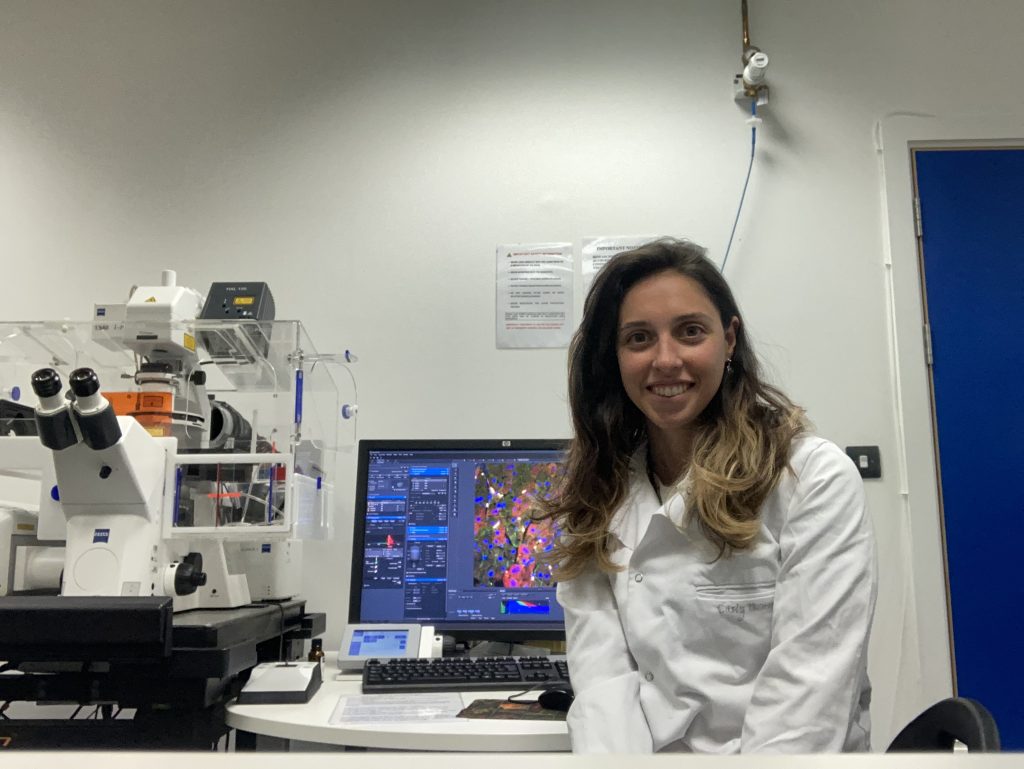
A Cardiff researcher has been awarded a Fellowship to discover new ways of identifying pancreatic cancer before it develops into a tumour.
Dr Beatriz Salvador was awarded the Career Foundation Fellowship from charity Pancreatic Cancer UK in April 2022. The Fellowships provide early career researchers the opportunity to develop the skills and experience needed to take the first step towards becoming an independent investigator.
Dr Salvador’s work is based at the European Cancer Stem Cell Research Institute (ECSCRI) at Cardiff University, under the mentorship of Dr Catherine Hogan. Her research aims to identify the cells where the disease originates and use this as an early detection tool.
Pancreatic cancer has a very low survival rate, as most cases are only diagnosed when the cancer has spread around the body. Around 10,500 new cases are diagnosed every year, making it the 10th most common cancer in the UK.
Dr Salvador said: “Research is so important for pancreatic cancer patients. As it is often diagnosed when it is too late, palliative care is usually the only option for patients. The current survival rate is 4-6 months; with 7% of patients surviving five years.
“That’s why I was drawn to specialise in pancreatic cancer. I wanted to find a way to help those people with fewer options. I started out in treatment research, before realising that treatments are only helpful to a degree if we can’t diagnose cases earlier. We need to understand what is happening at the beginning of the disease and ensure people are treated earlier, preferably with surgery.”
The aim of the Fellowship is to understand how pancreatic cancer is initiated and use that knowledge to develop effective detection skills. Dr Salvador hopes to find ways to diagnose the disease earlier, offering far better options to future patients in terms of treatment.
Dr Salvador added: “The Fellowship is two years long, and I hope the initial steps will establish my research and teaching group. This will give me the foundation on which the group will be based and lay the ground for my future research.
“I would like to thank Dr Hogan for her continued help and support. I really enjoy working with the team in Cardiff and am thrilled to have this opportunity to progress my work.”
About the project:
Although pancreatic ductal adenocarcinoma (PDAC) has been widely studied, little is known about how it develops. In most cases it starts with mutations in a gene called KRAS, which are detected in 99% of PDAC patients.
KRAS is a very important gene involved in several processes in the cell. When KRAS is mutated, cells can lose control over these processes and generate precancerous lesions called Pancreatic Intraepithelial Neoplasia (PanINs) that ultimately will give rise to tumours.
However, most research studies have used mouse models, in which every cell in the pancreas expresses KRas mutations. But tumours usually develop from mutations in only a small subset of cells. Moreover, our tissues have developed mechanisms to get rid of these precancerous cells and prevent tumour development.
During Dr Salvador’s research at Hogan’s lab, the team uncovered one mechanism that pancreas tissues use to ‘kick out’ KRas mutant cells, as they are recognised as ‘abnormal’ by the tissue.
However, some KRas mutant cells can override elimination signals from normal neighbours and remain in the tissue, potentially leading to the formation of dangerous PanINs that ultimately can produce pancreatic cancer.
Using a mouse model in which only some cells in the pancreas are KRas mutants, the team studies the relationship between normal and mutant cells. They also know that some cells in the pancreas are more likely to behave like stem cells than others. ‘Stem cells’ are long-lived cells in our bodies that enable organs like the gut and the skin to renew and repair. If these stem cells acquire KRas mutations, they may start to grow tumours.
Dr Salvador hypothesises that some KRas mutant cells that overcome cell elimination mechanisms have stem cell properties that make them ‘Early disease Progression Cells’ (EPCs). EPCs can generate PanINs and eventually progress to pancreatic cancer. Identifying and studying EPCs will identify markers that can be used as a tool to diagnose pancreatic cancer earlier.
Find out more about the Pancreatic Cancer UK Fellowships.